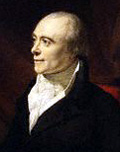Spencer Perceval was the second son of the Earl of Egmont, whose ancestors originated from Ireland. He received his MA degree from Trinity College, Cambridge. He was called to the bar in 1786 and practicised on the Midland Circuit. His political career began in 1796, when he was elected to Parliament for Northampton (MP, 1796-1812). Supported by his patron, William Pitt the Younger, Perceval held successively the two senior posts of Solicitor General (1801-1802) and Attorney General (1802-1806). As an enthusiastic Anglican, Perceval ensured his support for Wilberforce's anti-slavery campaign. He was appointed First Lord of the Treasury (4 Oct 1809) and became prime minister, but had a great difficulty in filling posts in his Cabinet and continued to be his own Chancellor of the Exchequer (1807-1812). While his 1810 Budget was successful, criticism of the Bank of England caused a prolonged financial crisis and increasing inflation caused by the war with Napoleonic France worsened economic problems. He took a firm line against growing restlessness of the population while not interesting himself in the causes of the unrest. Abroad, lack of military success and inability to conclude the war successfully brought increased pressure on his administration. Deteriorating health of King George III led to the successful passing of the Regency Bill (4 Feb 1811) and Perceval was also successful in curtailing financial support for the Prince Regent. The general situation was improving when he was murdered in the lobby of the House of Commons (11 May 1812) by a deranged man who had vainly applied to him for redress of a personal complaint against the government. Biography source: [1, pp. 98-103] |

